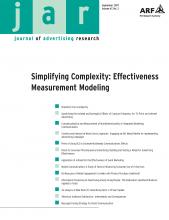Click on the PDF link for the complete article.
ABSTRACT
To help increase the effectiveness of television broadcasting and advertising, this article studies audience viewing behavior by investigating the antecedents and consequences of audience satisfaction of television programs. Besides two constructs (“cognitive expectation” and “audience involvement”) proposed by previous researchers, this article hypothesizes that “connectedness” and “TV programs' performance at attribute level” are two additional antecedents of audience satisfaction. Additionally, people's judgment on programs' attributes display loss aversion according to the well-known prospect theory. Consistent with satisfaction research in marketing, “repeat watching intention” and “audience voice” are proposed as two consequences of audience satisfaction. Moreover, the viewers' “likelihood to watch the embedded advertisements in order not to miss the following stories” is considered as another consequence of audience satisfaction. Empirical study is conducted to test the proposed theoretical hypotheses and the implications of the research results are discussed.
- © Copyright 2007 The ARF. All rights reserved.
ARF MEMBERS
If you are a member of the Advertising Research Foundation, you can access the content by logging in here
Log In
Pay Per Article - You may access this article (from the computer you are currently using) for 30 days for US$20.00
Regain Access - You can regain access to a recent Pay per Article purchase if your access period has not yet expired.





